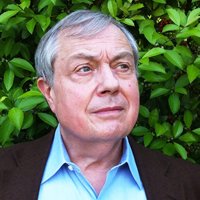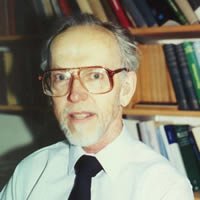Notre Dame philosopher headlines SU’s first William P. Alston Lecture Sept. 22
Peter van Inwagen, Alston taught at SU

Peter van Inwagen, the John Cardinal O’Hara Professor of Philosophy at the University of Notre Dame, is delivering the first annual William P. Alston Lecture at Syracuse University. Titled “Russell’s China Teapot,” the lecture will take place on Saturday, Sept. 22, at 4 p.m. in The Kilian Room (500) of the Hall of Languages. The event is free and open to the public. For more information, contact the philosophy department in SU’s College of Arts and Sciences at 315-443-2245.
The lecture is named for Alston, a prominent philosopher who taught with van Inwagen at SU during the 1980s and ‘90s, before Alston’s death in 2009 at the age of 87. The series is supported in part by a grant from The John Templeton Foundation and by donations from friends and former students of Alston’s.
“Peter van Inwagen personifies the intellectual and creative spirit of Bill Alston,” says Ben Bradley, associate professor and chair of SU’s philosophy department. “Both men helped redefine the field of analytic philosophy by writing on everything from metaphysics and philosophy of religion to divine will and philosophy of action. Their impact on SU is still felt today.”
“Russell’s China Teapot” was an analogy coined by 20th-century British philosopher Bertrand Russell that has been used in philosophical discussions about the existence of God. Russell wrote that if he claimed a teapot orbited the sun, it would be nonsensical for others to believe him because he could not be proven wrong.
“What Russell saw was an analogy in our epistemic situation between a belief in God and a belief 'that between the Earth and Mars there [was] a china teapot revolving around the sun in an elliptical orbit,’” adds Bradley. “This analogy not only makes an argument for atheism, but also forces us to confront religious epistemology in new ways.”
Van Inwagen is an internationally renowned expert in metaphysics and philosophical theology. In addition to various articles and essays, he has worked on 10 book projects, including “The Problem of Evil” (Oxford University Press, 2006) and “Ontology, Identity, and Modality” (Cambridge University Press, 2001), the latter of which contains essays that are considered modern classics in the field of metaphysics. More recently, he has shown an interest in the afterlife debate.
Van Inwagen is a member of the American Academy of Arts and Sciences, former president of the central division of the American Philosophical Association, and a recent recipient of an honorary degree from the University of St. Andrews (Scotland).
Also on Sept. 22 are two panel discussions in 500 HL:
“Three New Cartesian Circles”
Glenn Hartz (The Ohio State University), Patrick Lewtas (American University of Beirut), and Andrew Cortens (Boise State University)
10 a.m. to noon
“Propositional Faith”
Dan Howard-Snyder (Western-Washington University) and Mark Webb (Texas Tech University)
2 p.m. to 3:30 p.m.
The lecture is named for Alston, a prominent philosopher who taught with van Inwagen at SU during the 1980s and ‘90s, before Alston’s death in 2009 at the age of 87. The series is supported in part by a grant from The John Templeton Foundation and by donations from friends and former students of Alston’s.
“Peter van Inwagen personifies the intellectual and creative spirit of Bill Alston,” says Ben Bradley, associate professor and chair of SU’s philosophy department. “Both men helped redefine the field of analytic philosophy by writing on everything from metaphysics and philosophy of religion to divine will and philosophy of action. Their impact on SU is still felt today.”
“Russell’s China Teapot” was an analogy coined by 20th-century British philosopher Bertrand Russell that has been used in philosophical discussions about the existence of God. Russell wrote that if he claimed a teapot orbited the sun, it would be nonsensical for others to believe him because he could not be proven wrong.
“What Russell saw was an analogy in our epistemic situation between a belief in God and a belief 'that between the Earth and Mars there [was] a china teapot revolving around the sun in an elliptical orbit,’” adds Bradley. “This analogy not only makes an argument for atheism, but also forces us to confront religious epistemology in new ways.”
Van Inwagen is an internationally renowned expert in metaphysics and philosophical theology. In addition to various articles and essays, he has worked on 10 book projects, including “The Problem of Evil” (Oxford University Press, 2006) and “Ontology, Identity, and Modality” (Cambridge University Press, 2001), the latter of which contains essays that are considered modern classics in the field of metaphysics. More recently, he has shown an interest in the afterlife debate.
Van Inwagen is a member of the American Academy of Arts and Sciences, former president of the central division of the American Philosophical Association, and a recent recipient of an honorary degree from the University of St. Andrews (Scotland).
Also on Sept. 22 are two panel discussions in 500 HL:
“Three New Cartesian Circles”
Glenn Hartz (The Ohio State University), Patrick Lewtas (American University of Beirut), and Andrew Cortens (Boise State University)
10 a.m. to noon
“Propositional Faith”
Dan Howard-Snyder (Western-Washington University) and Mark Webb (Texas Tech University)
2 p.m. to 3:30 p.m.

Alston’s 50-year academic career included major stints at Michigan, Rutgers, and Illinois at Urbana-Champaign. By the time he arrived at SU in 1980, Alston was revered for his work in philosophy of language, epistemology, and philosophy of religion. He published several books and more than 150 articles, and was founding editor of “Faith and Philosophy” and the “Journal of Philosophical Research.”
Housed in The College, the philosophy department has a rich tradition of philosophical teaching and research in a collegial environment. The department offers a variety of graduate and undergraduate degree programs, and maintains a strong relationship with other philosophy departments around the country, including those at Cornell and Rochester.
Media Contact
Rob Enslin
